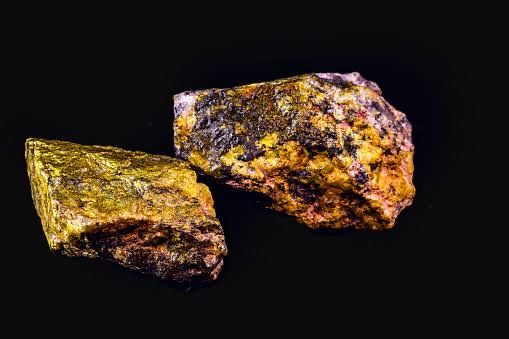Estonia's Uranium and Rare Earth Metals. The Rockstars of Sillamäe: BlackRock, Vanguard, and Fidelity
Estonia has a rich history of mining various minerals, including oil shale, phosphates, and limestone. However, few people are aware that Estonia also has uranium reserves, which have been mined in small quantities in the past. This essay will explore Estonia's uranium reserves, the history of uranium mining

Estonia has a rich history of mining various minerals, including oil shale, phosphates, and limestone. However, few people are aware that Estonia also has uranium reserves, which have been mined in small quantities in the past. This essay will explore Estonia's uranium reserves, the history of uranium mining in Estonia, current industry ownership, and the geopolitical implications of this valuable resource.
The Discovery of Uranium in Estonia
The history of uranium mining in Estonia can be traced back to the 1940s when the Soviet Union discovered uranium deposits in the country. The first uranium mine was established in Sillamäe, northeast Estonia, in 1946. However, the exact amount of uranium in Estonia is still unknown due to limited exploration activities.
Uranium Production in Estonia
From 1946 to 1990, uranium mining in Estonia was under Soviet control. The uranium was mainly extracted as a byproduct of oil shale mining. After Estonia regained its independence in 1991, uranium mining ceased, and the Sillamäe mine was closed. Currently, there are no active uranium mines in Estonia.
Ownership of Estonia's Uranium Industry
Currently, Estonia's uranium industry is not active. However, the rights to the uranium deposits belong to the state-owned company Eesti Energia, which also owns the majority of the country's oil shale industry. Eesti Energia has no plans to restart uranium mining due to the low global demand for the metal.
Geopolitical Implications of Estonia's Uranium Reserves
Estonia's uranium reserves are not significant on a global scale, and the country does not produce any nuclear energy. Therefore, the geopolitical implications of Estonia's uranium reserves are minimal. However, in the future, the demand for uranium may increase as nuclear energy becomes more widespread. If this were to happen, Estonia's uranium reserves could become a valuable asset for the country.
Estonia's uranium reserves have a long and complex history. Although there is currently no active uranium mining in Estonia, the country's reserves could become valuable in the future. As the world's energy needs change, it is important to monitor the potential of Estonia's uranium reserves and their geopolitical implications.
Silmet: Estonia's Rare Earth Metals Producer with Controversial Uranium Byproduct
Hallgarten & Co is a London-based independent investment research firm that specializes in the analysis of the mining and natural resource sectors, including uranium. In addition to its research activities, Hallgarten & Co is also the majority owner of Silmet, an Estonian company that operates a rare earth metals plant in Sillamäe.
Silmet produces a range of rare earth metals and other chemical products, including uranium, which is extracted as a byproduct of its main production. The company has been operating in Estonia for decades and has played an important role in the country's economy.
Silmet's uranium production has been a subject of controversy in Estonia, with some expressing concerns over the involvement of foreign investors in the country's strategic industries. However, it is worth noting that Silmet's uranium production is a relatively small part of its overall operations, and the company is subject to Estonian laws and regulations.
Silmet's uranium production is limited to the processing of uranium-containing raw materials, such as phosphoric acid, which is produced as a byproduct of the production of fertilizers. Silmet does not engage in uranium mining, and its uranium production is subject to strict regulations and oversight by the Estonian government.
Hallgarten & Co is the majority owner of Silmet, an Estonian company that operates a rare earth metals plant in Sillamäe. Silmet produces a range of rare earth metals and other chemical products, including uranium as a byproduct of its main production. However, Silmet's uranium production is limited and subject to strict regulations and oversight by the Estonian government.
There have been some controversies surrounding Silmet's operations in Estonia, including concerns over the involvement of foreign investors in the country's strategic industries and environmental issues related to the processing of rare earth metals.
One of the major concerns has been the company's production of uranium as a byproduct of its main production. While Silmet's uranium production is limited and subject to strict regulations and oversight by the Estonian government, some have raised concerns over the potential risks associated with uranium mining and processing.
In recent years, there have been growing concerns over China's dominance in the global rare earth metals market, as China controls a significant share of the world's rare earth metals production and processing. As a result, there have been efforts by other countries to develop their own rare earth metals production capabilities and reduce their dependence on China.
Estonia's rare earth metals industry, including Silmet, has been seen as a potential alternative to Chinese supply. In 2020, the Estonian government announced plans to invest in the development of its rare earth metals industry, with a goal of increasing the country's self-sufficiency in the sector and reducing its dependence on China.
However, it is worth noting that Silmet's ownership by Hallgarten & Co, a London-based firm, is not directly linked to Chinese interests. Hallgarten & Co is an independent investment research firm that specializes in the analysis of the mining and natural resource sectors, including rare earth metals.
While there may be strategic interests in the global rare earth metals market, the ownership of Silmet by Hallgarten & Co is not necessarily indicative of Chinese involvement or influence.
Confusion over ownership
Allegedly, as of 2017, Silmet was owned by Shenghe Resources Holding and its subsidiary Neo Performance Materials, a Canadian rare earth and rare metal materials company.
Shenghe Resources Holding Co., Ltd. is a Chinese company that specializes in the exploration, mining, processing, and sales of rare earth minerals. The company was founded in 2003 and is headquartered in China's Sichuan Province.
Shenghe Resources Holding is one of the largest producers of rare earth minerals in China and has significant interests in several rare earth mines in the country. The company is also involved in the production of rare earth metals, alloys, and powders, as well as the development and manufacture of rare earth-based magnetic materials and hydrogen storage materials.
Neo Performance Materials is a publicly traded Canadian company that specializes in the production of rare earth and rare metal-based materials. The company was formerly known as Molycorp and was the owner of Silmet before it was acquired by Shenghe Resources Holding in 2017.
In addition to its ownership of Silmet, Shenghe Resources Holding has also invested in other rare earth mining and processing operations around the world. The company has a global presence with offices and operations in several countries including the United States, Canada, and Australia.
Sillamäe's Rare Earth Revolutionaries: BlackRock, Vanguard, and Fidelity
NPM Silmet OÜ is actually a subsidiary of Neo Performance Materials, which acquired Silmet from Shenghe Resources Holding. Neo Performance Materials owns 100% of Silmet's shares through NPM Silmet OÜ.
The management and ownership structure of NPM Silmet OÜ is similar to that of Neo Performance Materials. The company's largest shareholders are various institutional investors, including companies such as BlackRock, Vanguard, and Fidelity.
NPM Silmet OÜ is located in Sillamäe, Estonia, and is engaged in the processing and production of rare earth metals. The company specializes in the production of rare earth metals such as neodymium, praseodymium, dysprosium, and terbium, as well as the production of magnetic and luminescent materials based on these metals.
Acquisition and Ownership Changes Over the Years
Neo Performance Materials acquired Silmet from Shenghe Resources Holding in 2019 and now owns 100% of the shares through its subsidiary NPM Silmet OÜ. Hallgarten & Company is a well-known advisor and investment bank specializing in commodity markets, including rare earths. While they are not owners of Silmet, they have advised both Silmet and Neo Performance Materials for years. Shenghe Resources Holding acquired Silmet in 2012 from Molycorp, a US-based rare earths producer.
Molycorp acquired Silmet in 2011 from Silmet's previous owner, a group of Estonian investors. The acquisition was part of Molycorp's strategy to vertically integrate its rare earth supply chain. However, Molycorp faced financial difficulties and filed for bankruptcy in 2015. Shenghe Resources Holding then acquired Silmet from Molycorp in 2016, as part of its strategy to expand its rare earth assets outside of China. Neo Performance Materials later acquired Silmet from Shenghe Resources Holding in 2019, becoming the sole owner of the company.




